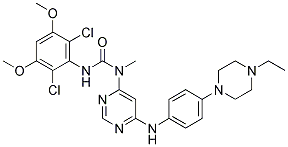All AbMole products are for research use only, cannot be used for human consumption.

BGJ398 (Infigratinib) is a potent and selective FGFR kinase inhibitor with IC50 values of 0.9 nM, 1.4 nM, 1 nM and 60 nM for FGFR1, FGFR2, FGFR3 and FGFR4, respectively. BGJ398 selectively binds to and inhibits the activities of FGFRs, which may result in the inhibition of tumor angiogenesis and tumor cell proliferation, and the induction of tumor cell death. FGFRs are a family of receptor tyrosine kinases which may be upregulated in various tumor cell types and may be involved in tumor cell differentiation and proliferation, tumor angiogenesis, and tumor cell survival. BGJ398 significantly decreases the levels of pFRS2 and pMAPK in a dose-dependent manner. BGJ398 does not impair VEGF-induced blood vessel formation. In contrast, BGJ398 inhibits significantly bFGF-stimulated angiogenesis in a dose-dependent manner.

Exp Cell Res. 2020 Nov 1;396(1):112237.
LRTM1 promotes the differentiation of myoblast cells by negatively regulating the FGFR1 signaling pathway
BGJ398 (Infigratinib) purchased from AbMole
| Cell Experiment | |
|---|---|
| Cell lines | MFE280, SPAC1L, MFE319 cell lines |
| Preparation method | Proliferation assays Cells were plated into 24-well tissue culture plates at a density of 2 × 105 to 5 × 105 and grown without or with increasing concentrations of dovitinib or NVP-BGJ398 (ranging between 0.001 and 10 μmol/L). Cells were harvested by trypsinization on day 7 and counted using a particle counter (Z1; Beckman Coulter Inc.). Experiments were carried out at least 3 times in duplicate for each cell line. Growth inhibition (GI) was calculated as a function of the number of generations. As such, the percentage inhibition was calculated as 1− (cell count divided by cell count of untreated controls). The log of the fractional GI was then plotted against the log of the drug concentration, and the IC50 values were interpolated from the resulting linear regression curve fit (CalcuSyn; Biosoft). |
| Concentrations | 0.001 ~ 10 Μm |
| Incubation time | 7 days |
| Animal Experiment | |
|---|---|
| Animal models | athymic mouse model of endometrial cancer xenografts |
| Formulation | 6 mg in 0.5 mL PEG300 and 0.5 mL acetic acid/acetate buffer, pH 4.68 |
| Dosages | 30 mg/kg |
| Administration | oral gavage |
| Molecular Weight | 560.48 |
| Formula | C26H31Cl2N7O3 |
| CAS Number | 872511-34-7 |
| Solubility (25°C) | DMSO 10 mg/mL |
| Storage |
Powder -20°C 3 years ; 4°C 2 years In solvent -80°C 6 months ; -20°C 1 month |
| Related FGFR Products |
|---|
| SNIPER(TACC3)-11
SNIPER(TACC3)-11 is a potent FGFR3-TACC3 degrader. |
| LY-3076226
LY-3076226 is an antibody drug coupling (ADC) with a cleavable linker targeting FGFR2. |
| Aprutumab ixadotin
Aprutumab ixadotin is an antibody drug coupling (ADC) with a non-cleavable linker that targets FGFR2. |
| Gunagratinib
Gunagratinib is an orally active, potent, selective, and irreversible fibroblast growth factor receptor (pan-FGFR) inhibitor for use in cancer research. |
| SAR-442501
SAR-442501 is a novel anti-FGFR3 monoclonal antibody for studies related to achondroplasia (ACH). |
All AbMole products are for research use only, cannot be used for human consumption or veterinary use. We do not provide products or services to individuals. Please comply with the intended use and do not use AbMole products for any other purpose.


Products are for research use only. Not for human use. We do not sell to patients.
© Copyright 2010-2024 AbMole BioScience. All Rights Reserved.
